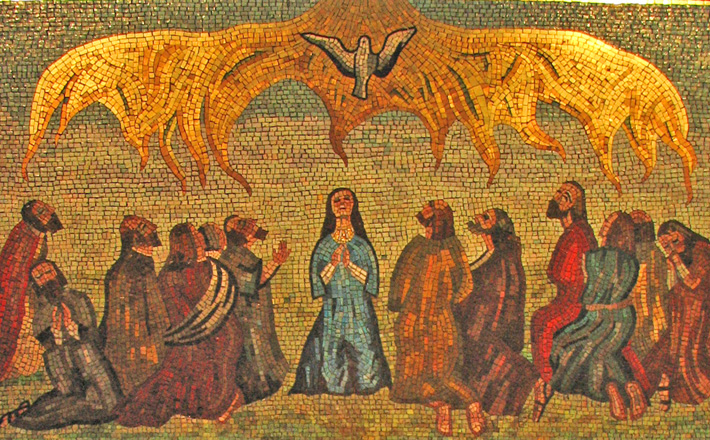Commentary on Acts 2:1-21
On the day of Pentecost, a small crowd gathered in a room on the highest floor of a house in Jerusalem to wait for the manifestation of the promise Jesus made before his ascension.
The promise was that the followers of Jesus would be baptized, not with water, but with the Holy Spirit. The baptism of the Holy Spirit would give the people power to be witnesses of Jesus, in word or deed, in Jerusalem, Judea, Samaria, and to the ends of the earth.
The crowd of about 120 people consisted of the 11 remaining disciples, women (including Jesus’ mother Mary), Jesus’ brothers, and other followers of Jesus. Very often, the presence of women at Pentecost gets lost in the masculine/male language. For example, when Peter rises up to speak to the crowd after the arrival of the Holy Spirit (in the NRSV), he addresses the “men of Judea” as if women were not even there. Women who had been healed of evil spirits and sicknesses, such as Mary Magdalene, Joanna, Susanna, and others not only followed Jesus, but they supported Jesus’ work using their own resources (see Luke 8:1-3).
The women of the Pentecost received the power of the Holy Spirit just as the men did in fulfillment of the words of the prophet Joel, “I will pour out my Spirit upon all flesh, and your sons and your daughters shall prophesy” (Joel 2:28). This text is a reminder to churches and ministries that still refuse to allow women to serve in leadership positions that since the day of Pentecost, the Holy Spirit has been poured out on all people of God, empowering them equally to do the will and work of Jesus Christ.
Very often when we preach this text, we concentrate on the power of the wind that swept the Holy Spirit into the room. We preach about the power of the Holy Spirit in general or its power to cause people to speak in other tongues in particular. We preach about the miracle of multiple languages being spoken but each person hearing others in his (there seemed to only be males in attendance) language. We preach about Pentecost being a foundational event in the life of the Christian church.
There may be a slightly different way of understanding this passage: the power of the Holy Spirit to transcend difference. After the Holy Spirit invaded the space, a crowd of thousands began to gather outside. In the crowd were Jews from many different nations including Greeks, Arabs, Romans, Africans, and Asians, just to name a few. Each of the people in the crowd could understand the conversation in the upper room in his own language.
The power of the Holy Spirit was at work in the situation in so many ways:
- The promise of the Holy Spirit compelled 120 people to gather in anticipation of it. They rearranged their schedules and synchronized their calendars to make themselves available to God.
- The power of the Holy Spirit enabled each person in that room to speak in a language other than their own.
- The power of the Holy Spirit got the attention of the crowd on the street, perhaps because of the mighty sound of the rushing wind or the sheer chaos of all those people speaking together at the same time.
- The power of the Holy Spirit emboldened Peter to speak to the masses.
- The power of the Holy Spirit caused the crowds to not only hear Peter’s message but to also receive it to such an extent that 3,000 people made a decision to follow Jesus.
On this one day, the Holy Spirit transcended multiple layers of differences to accomplish God’s many purposes.
How many of our differences could be transcended if we allowed the power of the Holy Spirit to reign in our lives? What miracles could the Holy Spirit perform in our churches and communities if we embraced it and invited it into our midst? How many hearts and minds could the Holy Spirit possibly transform, if we prayed for the Holy Spirit to have its ways in our communities? This text is an opportunity for pastors to remind hearers of the role and power of the Holy Spirit to transcend difference.
Another angle of this text is the sudden holy boldness of Peter. When I read this account of Peter, I wonder, who is this man who addresses a crowd of thousands and demands to be heard? Who is this man who does not simply make a speech but preaches a sermon? I say he preaches a sermon because he takes a text and communicates the good news of Jesus Christ. That’s a sermon, right?
Who is this man who so skillfully crafts his message using a progressive rhetorical strategy: He first calls his hearers Israelites, then fellow Israelites, then brothers. Is this Peter? Simon Peter? Is this the, “I don’t know the man, I have never heard of Jesus,” Peter? Is this the same Peter who regretted his betrayal of Christ so much that he wept bitterly, according to Luke? Now we know that before the betrayal, Peter was never at a loss for words. In fact, when Jesus asked the disciples on one occasion who they thought Jesus was, it was Peter who responded, “the messiah of God.” It was Peter who asked clarifying questions when Jesus was teaching them.
On one occasion after Jesus told a parable about the watchful servants, Peter asked, “Is this parable for us disciples or for everybody?” Though he spoke sometimes on behalf of the disciples during Jesus’ earthly ministry, we never heard him preach. There was never an indication that he knew the scriptures very well.
However, at some point between the time of Peter’s denial of Jesus and when he stood up and preached his first public sermon in this text, Peter got a bit of holy boldness. Something got a hold of him. Something made him stand before thousands, open his mouth, and testify about Jesus.
What could cause someone to do that? On the day of Pentecost, the Holy Spirit came. And on that day, Peter, and all those with him, received power. Peter was never the same. The one who had denied Christ began to publicly preach Christ to any and all who would listen.


May 31, 2020